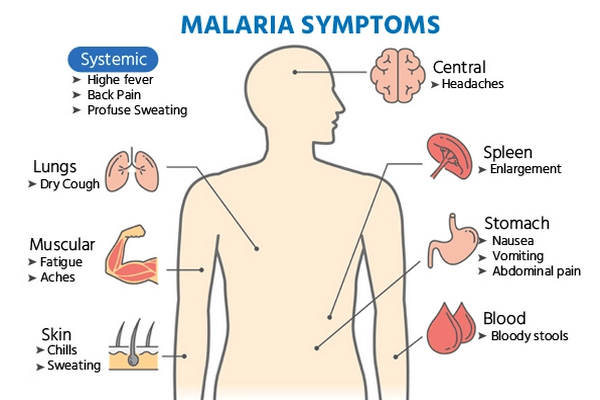Signs, Complications and Symptoms of Malaria Disease
Definition of Malaria Disease:
Malaria is an infectious disease caused by plasmodium and transmitted by the bite of female anopheles mosquito, characterized by-fever, anemia, splenomegaly etc. It is a protozoal disease caused by infection with parasites of the genus plasmodium and transmitted to man by certain of infected female anopheles mosquito.

Malaria is a mosquito-borne infectious disease affecting humans and other animals caused by parasitic protozoans (a group of single-celled microorganisms) belonging to the Plasmodium type. Malaria causes symptoms that typically include fever, tiredness, vomiting, and headaches.
Mode of Transmission of Malaria Disease:
1. Vector transmission: Infected female anopheles mosquito.
2. Direct transmission:
- Blood transmission,
- Infected needles,
- Congenital-very very rare.
3. Incubation period: Varies according to species-
- 12 (9- 14) days forP. falciparum
- 14 (8-17) days for P. vivax
- 28 (18 – 40) days for P. malariae
Clinical Features or Sign, Symptoms of Malaria Disease:
The typical paroxysmal attack of malarial fever found in three stages, i.e. cold stage, hot stage and sweating stage followed by an afebrile period.
1. The onset of cold stage is usually found with
- Lassitude,
- Headache,
- Anorexia,
- Nausea,
- Pain in the limbs and chilly sensation followed by rigors within an hour.
- Then body temperature rises rapidly to 39 to 41 °c with severe headache, vomiting, restlessness, weakness and rapid pulse. In early stage the skin feels cold and later it becomes hot.
- Duration of this stage is 1/4 to one hour. Parasites are usually found in the blood in this stage. Chills and rigors may not be found in infancy and early childhood.
2. In the hot stage, patient feels too much hot and put off clothing.
- The skin is flashed, hot and dry.
- Headache becomes intense with full pulse and rapid respiration.
- Nausea usually diminished with presence of excessive thirst. This stage last for 2 to 6hours.
3. In the sweating stage, body temperature rapidly reduces to normal with profuse sweating. Skin feels cool and moist. The pulse rate becomes slower. The patient feels relieved and fails asleep. This stage last for 2 to 4 hours.
Complications of Malaria Disease:
It includes the following:
- Coma,
- Severe anemia,
- Hyperpyrexia,
- Hypoglycemia,
- Acute renal failure,
- Acute pulmonary oedema,
- Spontaneous bleeding & coagulopathy,
- Metabolic acidosis,
- Shock,
- Aspiration pneumonia.
More questions related to this article:
- What is malaria?
- What do you mean by malaria?
- Write down the mode of transmission of malaria.
- Write down the clinical features of malaria.
- What are the sign and symptoms of malaria disease?
- Write down the complications of malaria?

Maria Khatun Mona is a Founder and Editor of Nursing Exercise Blog. She is a Nursing and Midwifery Expert. Currently she is working as a Registered Nurse at Evercare Hospital, Dhaka, Bangladesh. She has great passion in writing different articles on Nursing and Midwifery. Mail her at “maria.mona023@gmail.com”
